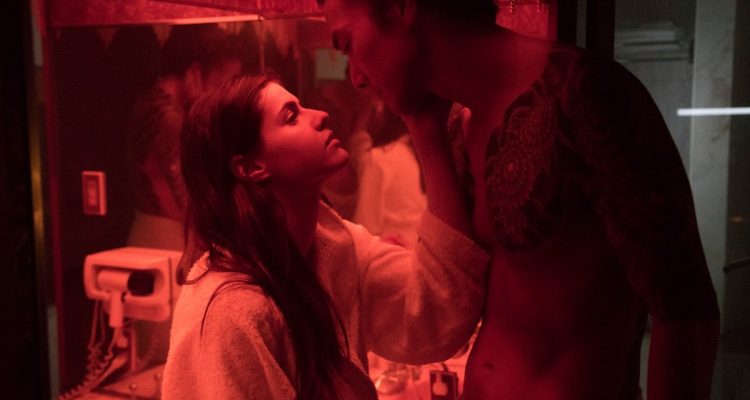In William Olsson’s “Lost Girls & Love Hotels,” Margaret (Alexandra Daddario), is spiraling out of control. An American expat living in Japan, the young woman spends her days fighting off a hangover, barely competent enough to hold a job, and her nights drunkenly talking in bars followed by late-night sexual encounters with strangers. Rinse, repeat. Margaret isn’t doing well. And the last thing she needs is a wild, passionate affair with a gangster that is surely going to end in heartbreak. Or maybe, that’s exactly what she needs.
“Lost Girls & Love Hotels” is really two movies in one, each being separated by the time of day. When the sun is out, Olsson’s film is a flatly colored, slow-paced look at a woman on the path of self-destruction after escaping her life and moving abroad. Her long nights turn into rough mornings; she is aimless and unhappy, working a job that she is quick to tell people isn’t nearly as prestigious as it sounds. She’s not so much an English teacher as she is a professional “English pronunciator,” which obviously has lots of grueling fml dimensions.
READ MORE: Toronto International Film Festival 2020 Preview: 15 Films To Watch
But as the sun sets, Margaret is reborn, as is the movie, and it suddenly comes alive, transforming into an erotic drama with bright colors, loud music, and kinky sexual encounters. Margaret drinks away her problems, using her piercing blue eyes to render men helpless and luring them to love hotels where she can use them for her own twisted form of therapy. This normally includes asking shy, unassuming Japanese men to wrap a belt around her neck and choke her and/or zip-tie her wrists together so that she’s just a helpless submissive.
READ MORE: 2020 Fall Film Preview: 40 Most Anticipated Films To Watch
However, no matter what time of day, it’s clear that Margaret is on a bad path with no end in sight. There’s the potential that the random men she takes to hotels could turn out to be violent, but that’s a risk she’s willing to take. Actually, excited to take. That leads her to a chance encounter with Kazu, a tattooed Japanese gangster that is willing to satisfy Margaret’s sexual desires but also wants to help her grow, which is something the young woman is seemingly opposed to. That said, there’s something about Kazu that stops Margaret in her tracks. Unfortunately, this relationship is also doomed to fail, and if it does, there’s a high risk that the young woman will never really recover.
Olsson’s film often feels two modes at odd with each other—is it a “9 ½ Weeks”-style erotic thriller about a young American woman’s wild nights in Japan or is it actually a “Leaving Las Vegas”-esque tale of horrible self-destruction about our secret damage? The film never really commits to either, often trying to titillate with its kinky sex scenes (which often fall well short of “50 Shades” levels of gratuitousness), but also make you want to grab Margaret for an intervention. Often, you find yourself watching the beautiful Margaret engaging in some truly erotic situations with an incredibly handsome stranger. But the actions during the day make you view this as if you’re some sort of parental figure, just wanting to jump through the screen and rescue the precious girl from her own vicious-cycle behavior.
Thankfully, even though the film has tonal issues and structural shortcomings, Alexandra Daddario is truly captivating as Margaret. While the actress is probably best known for roles in comedies such as “Baywatch” and “The Layover” or big-budget spectacles like “Percy Jackson” and “San Andreas,” arguably her greatest performance so far is in the first season of HBO’s “True Detective.” In “Lost Girls & Love Hotels,” she’s finally given a role that once again shows the maturity and skill she can bring to a project if she’s given the opportunity.
The key to the success of her performance in ‘Lost Girls’ is because Olsson clearly understands that Daddario’s beauty and face is a secret weapon that the camera loves. So, the best moments in the film aren’t when she’s reciting poetic narration, engaging in drunken conversations, or succumbing to emotional breakdowns. It’s the stillness of almost doing nothing and letting the internalized damage behind the eyes do the talking. Daddario’s facial expressions allow for so much of the pain and trauma that is bubbling up below the surface to be seen without terribly melodramatic exposition. In fact, much of Margaret’s backstory is mercifully absent. And the mystery works because it’s the many expressions of pain and hurt that fill in the blanks and tell the real tale.
Daddario isn’t the only person turning in great work in “Lost Girls & Love Hotels.” Kazu is played by veteran Japanese actor, Takehiro Hira, and done so with a quiet intensity that perfectly suits his tortured gangster character. Carice van Houten also appears as one of Margaret’s closest friends, acting as a mother figure while clearly still struggling on her own. The rest of the cast is filled with folks that pop up occasionally but aren’t truly fleshed out enough to remember. Often, the characters outside of Kazu and Margaret exist only to ask questions and populate scenes with some sort of chatter that is often inconsequential.
If not for the performance of Daddario, “Lost Girls & Love Hotels” could have been a disaster. The dialogue is clunky, and the story borders on meandering in spots. And Olsson never fully chooses a lane between being an erotic drama or self-destructive character study which truly disappoints. But thanks to the leading performance, ‘Lost Girls’ is at least a compelling look at the seedier side of Japan through the entrancing eyes of an American woman on the verge of collapse. [B-]
“Lost Girls & Love Hotels” is available now on VOD.

